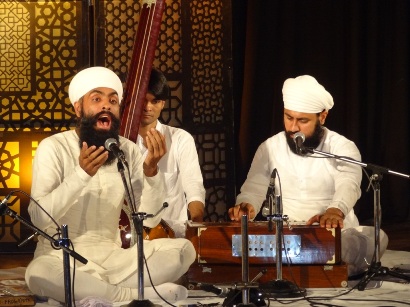 24th May, 2015
24th May, 2015A two-day festival of traditional Punjabi music opened today in the national capital, putting the spotlight on the beautiful Kheyal Gayeki tradition of Punjab that has enchanted lovers of Hindustani Classical music.
If one talks about the cultural heritage of Punjab, the mellifluous kheyal ‘bandishes’ (Compositions) cannot be left out from the discourse. In fact, this is a genre of ‘Gayeki’ which has enriched the Hindustani Classical music for more than two centuries now.
Punjabi Academy, Govt. of Delhi, Department of Art, Culture & Languages, Govt. of Delhi; has brought together renowned artists of this genre for two days on the 21st of May, Thursday and 22nd May, Friday at the India International Centre.
Hon’ble Deputy Chief Minister of Delhi, Shri Manish Sisodia inaugurated the festival. While Shri Sisodia was the Chief Guest; Shri Jetinder Singh Tomar, Hon’ble Minister for Law & Justice; Tourism; Gurdwara Elections and Art, Culture & Languages, Govt. of Delhi was the Guest of Honour.
The Festival began with a performance of Bhai Balwant Singh Namdhari who rendered kheyal gayeki with tabla mridang in the traditional style of Punjab. His performance was followed by Sh. Raza Ali Khan who sang the traditional Punjabi Kheyal bandishes.
Before the advent of Kheyal, there were four famous Gharanas of Dhrupad singing in the Punjab, Talwandi, Haryana, Sham Chaurasi and Kapurthala. Kheyal Gayeki emerged as the next stage of evolution in the history of Hindustani music as the strict discipline of earlier days gave way to greater expansiveness and liberty of expression in the musical firmament. The process of this evolution had started with the creative endeavors of Amir Khusroe in the 12th century and completed itself under the vibrant outpourings of Niamat Khan Sadarang and Ferozkhan Adaran who gave the Kheyal style its present stamp.
Kheyal Gayeki remained confined to Delhi for some time, and it was only later during the 19th century that the new style reached the Punjab. From Delhi, it was first taken to Gwalior where Haddu Khan and Hassu Khan laid the foundation of the Gwalior Gharana of Kheyal singing. Banne Khan Nangliwale learnt from them and went to Punjab and taught stalwarts such as Pyare Khan, Umaid Ali Khan and Mubarak Ali Khan. Meanwhile, “Jamail” Ali Bakshi and “Kaptaan” Fateh Ali of Patiala became Shagirds of Tanras Khan of Delhi who had also learnt from Haddu-Hassu Khan of Gwalior, and from Mubarak Ali of Jaipur (son of Bare Mohd Khan). They founded the Patiala Gharana of Music, from which flows an important line of Kheyal Gayeki of the Punjab. This genre of gayeki further evolved over the 20th century and adopted new ways of rendition and musical instruments.
“As you are aware the Punjab has always been renowned for its beautiful “Bandishes” which have enriched the repertoire of Hindustani Classical Music. Punjabi is the only other language, apart from Braj Bhasha, in which Kheyal Bandishes have been written over the centuries. Shah Sada Rang and Ada Rang, creators of the Kheyal style of Hindustani Classical Music, have also composed some beautiful Bandishes in Punjab which will be presented in this Festival. Over the last two centuries, Hindustani Musicians whether from the Punjab or elsewhere, have sung these Punjabi Kheyal compositions. It is our effort through this Festival to revive an interest in them by encouraging their research and presentation,” says Ms. Geetanjali Gupta, Secretery, Art, Culture & Languages, Government of Delhi.
The second day of the festival will have Qutubi Qawwal from the Dargah presenting the Sufi Qawwali from Punjab and Pandit Yashpaul rendering the Punjabi Kheyal Bandishes.
“Through this annual festival, our effort is to revive interest and attract youngsters to this beautiful form of classical vocal music. We also want to encourage research and presentation in the art form that is an intrinsic part of our composite culture,” says Shri Jawahar Dhawan, Secretary, Punjabi Academy.
